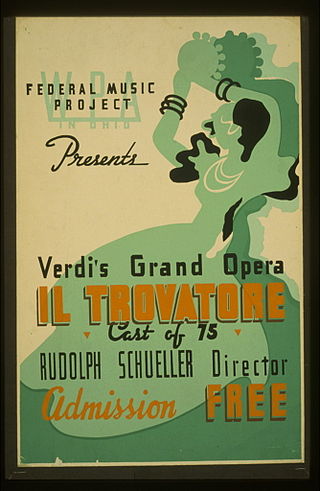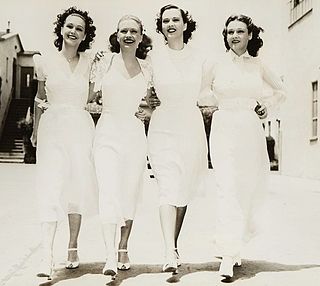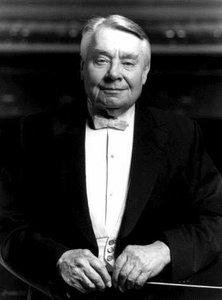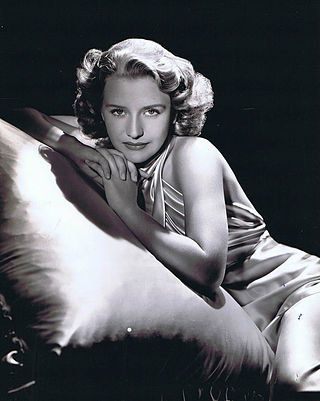
Occidental College is a private liberal arts college in Los Angeles, California. Founded in 1887 as a coeducational college by clergy and members of the Presbyterian Church, it became non-sectarian in 1910. It is one of the oldest liberal arts colleges on the West Coast of the United States.

This is a list of notable events in music that took place in the year 1937.

Richard Ewing Powell was an American actor, singer, musician, producer, director, and studio head. Though he came to stardom as a musical comedy performer, he showed versatility and successfully transformed into a hardboiled leading man, starring in projects of a more dramatic nature. He was the first actor to portray private detective Philip Marlowe on screen.

The Lane Sisters were a family of American singers and actresses. The sisters were Leota Lane, Lola Lane, Rosemary Lane and Priscilla Lane.

Fredrick Malcolm Waring Sr. was an American musician, bandleader, choral director, and radio and television personality, sometimes referred to as "America's Singing Master" and "The Man Who Taught America How to Sing". He was also a promoter, financial backer and eponym of the Waring Blendor, the first modern electric blender on the market.

Robert Lawson Shaw was an American conductor most famous for his work with his namesake Chorale, with the Cleveland Orchestra and Chorus, and the Atlanta Symphony Orchestra and Chorus. He was known for drawing public attention to choral music through his wide-ranging influence and mentoring of younger conductors, the high standard of his recordings, his support for racial integration in his choruses, and his support for modern music, winning many awards throughout his career.

The Rover Boys, or The Rover Boys Series for Young Americans, was a popular juvenile series written by Arthur M. Winfield, a pseudonym for Edward Stratemeyer. Thirty titles were published between 1899 and 1926 and the books remained in print for years afterward.

John Elmer Carson, known as Jack Carson, was a Canadian-born American film actor. Carson often played the role of comedic friend in films of the 1940s and 1950s, including The Strawberry Blonde (1941) with James Cagney and Arsenic and Old Lace (1944) with Cary Grant. He appeared in such dramas as Mildred Pierce (1945), A Star is Born (1954), and Cat on a Hot Tin Roof (1958). He worked for RKO and MGM, but most of his notable work was for Warner Bros.
The Robert Shaw Chorale was a renowned professional choir founded in New York City in 1948 by Robert Shaw, a Californian who had been drafted out of college a decade earlier by Fred Waring to conduct his glee club in radio broadcasts.

The Texas A&M Singing Cadets are a male choral group at Texas A&M University. Nicknamed "The Voice of Aggieland", the Singing Cadets have been touring for 109 seasons, with their roots in a glee club founded on the A&M campus in 1893. The Singing Cadets are one of the oldest collegiate singing organizations in the world. They have toured both in America and abroad and have earned recognition by doing so, including invitations to sing for American presidents. Contrary to their name, the Singing Cadets are not all members of the Corps of Cadets and have not been since 1963, when the university as a whole ceased mandating Corps membership. Between 1996 and 2006, the Singing Cadets traveled over 35,000 miles and performed more than 450 concerts worldwide.

Cowboy from Brooklyn is a 1938 American Western musical romantic comedy film directed by Lloyd Bacon and written by Earl Baldwin. It stars Dick Powell, Pat O'Brien and Priscilla Lane. The film was based on the 1937 Broadway play Howdy Stranger by Robert Sloane and Louis Pelletier.

Rosemary Lane was an American actress and singer. She is known for her performances with Lola and Priscilla as the Lane Sisters and Fred Waring's Pennsylvanians in the 1930s, and for her film career in the 1930s to 1940s.

Priscilla Lane was an American actress, and the youngest sibling in the Lane Sisters' family of singers and actresses. She is best remembered for her roles in the films The Roaring Twenties (1939) co-starring with James Cagney and Humphrey Bogart; Saboteur (1942), an Alfred Hitchcock film in which she plays the heroine; and Arsenic and Old Lace (1944), in which she portrays Cary Grant's fiancée and bride.

The Duplex, also known as The Duplex Piano Bar and Cabaret, is a historical gay bar, piano bar, and cabaret theater in the Greenwich Village neighborhood in Manhattan, New York City. The Duplex originally opened in 1951 on 55 Grove Street nearby in the same neighborhood, and moved to its current location at 61 Christopher Street in 1989.

Lola Lane was an American actress and one of the Lane Sisters with her sisters Leota, Rosemary, and Priscilla Lane. She appeared on Broadway and in films from the 1920s to 1940s.

The Wyoming Cowboy Hall of Fame is a cowboy hall of fame. Established in 2013, the Wyoming Cowboy Hall of Fame exists to enrich Wyoming's cowboy and ranch heritage through various means as it sees fit. Its main purpose in doing this is to recognize individuals in the state who established the first trails and brought this culture here.
Joan Wheatley is an American mezzo-soprano singer who performed in personal appearances, on radio, and on Broadway.
Howard Shelton Swan was an American choral conductor, tenor, music educator, and writer on music. A highly influential figure in American choral music during the 20th century, Swan was sometimes referred to as the "Dean of American Choral Directors" during his lifetime. A choral director and professor of voice at Occidental College from 1934 through 1971, his choirs at Occidental gained international critical acclaim. Conductor Robert Shaw stated about Swan's choral work at Occidental that it was "the most distinguished and varied choral repertoire at the highest level of performance in American collegiate history."














